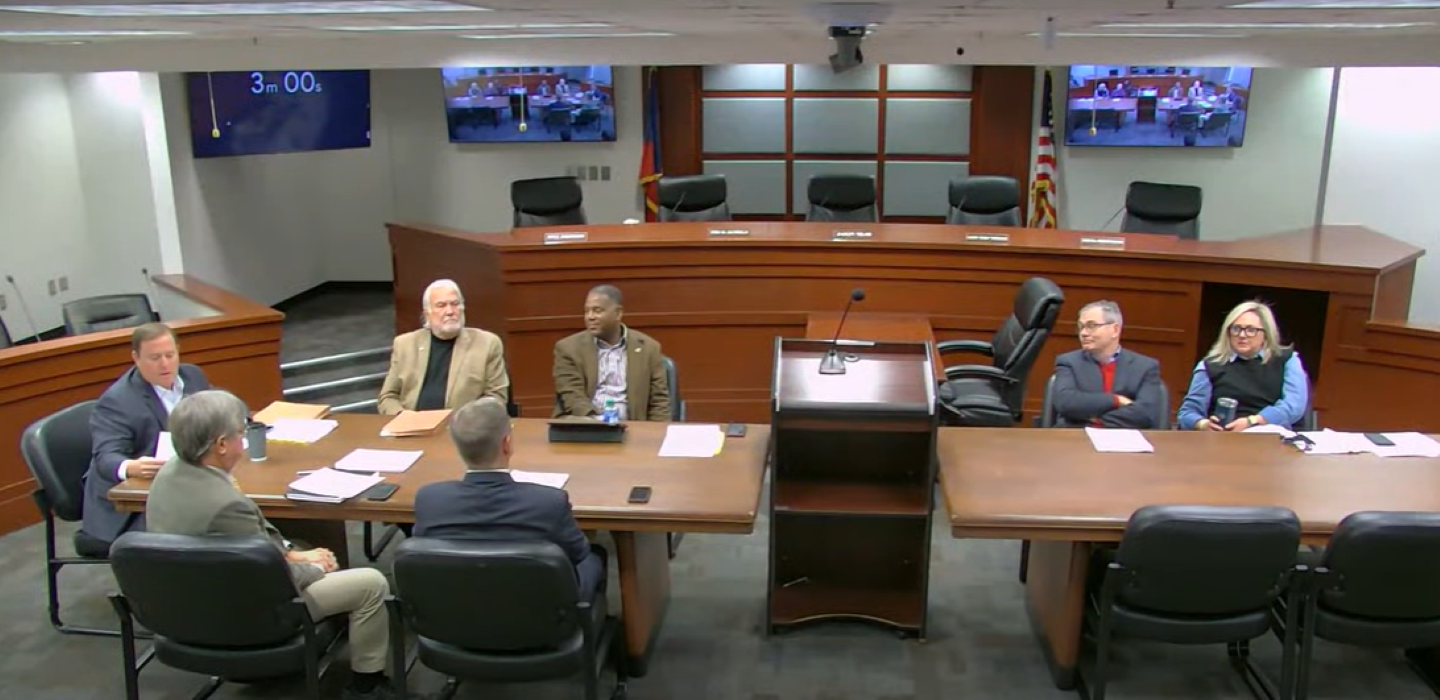Court decision expected soon on Georgia Public Service Commission election

When Georgia voters head to polls on Tuesday, new energy regulators won’t be on the ballot. More than a year after the election for two of the five Public Service Commissioners was removed from the 2022 ballot, the PSC races remain in limbo, and two commissioners remain in office despite their terms’ expiration.
The situation prompted activist groups on Friday to request a delay in an upcoming PSC hearing that will contemplate the largest rate increase in state history. It also has one candidate contemplating a departure from the never-ending race.
How we got here
The PSC is a five-member board that is voted on state-wide for six-year terms on a rotating basis. It regulates monopoly utilities, including Georgia Power, and thus has a huge influence on Georgians’ pocketbooks. While commissioners are voted on state-wide, they are required to live in the district of the seat for which they’re running.
In 2020 Black voters challenged this at-large system, arguing it weakened Black voters’ voices, violating the Voting Rights Act of 1965. On August 5th, 2022, Judge Steven Grimberg ruled in their favor.
The State of Georgia appealed, and Judge Grimberg’s ruling was overturned by the 11th Circuit Court of Appeals. The plaintiffs then appealed to the U.S. Supreme Court, which reinstated Grimberg’s original ruling and removed the PSC race from the November 2022 ballot.
The Supreme Court then sent the case back to the 11th Circuit Court for review. A three-judge panel heard oral arguments in December, with both sides requesting an expedited review. They didn’t get one. No decision has been rendered as of Nov. 2, 2023.
Decision expected soon
In response to a request for comment, Kate Adams, attorney advisor for the Circuit Executive’s Office, said, “I cannot speak as to when the Court will take action or provide updates to cases.”
But Atlanta-based civil rights attorney Brian Sells, who represents the original plaintiffs, expects a decision by Nov. 13, the date by which Judge Grimberg indicated he will start drawing up a remedial plan if there is no ruling from the 11th Circuit.
The Georgia General Assembly could have taken up the matter during the 2023 legislative session but did not. Nor is it on the agenda for the upcoming special session beginning Nov. 29, called to redraw Congressional districts and state house and senate seats because a court found the current ones are racially discriminatory.
Plaintiff Brionte McCorkle, the executive director of Georgia Conservation Voters, said the lengthy delay in ruling could be a good or bad sign for her side.
“The good scenario is that what could be taking so long is that they’re going to uphold the original ruling … and then somebody’s writing a dissent,” she said in a telephone interview with The Current. And dissents take longer. So it could be that someone’s angrily firing off, and that’s what’s taking so long.”
They also could be taking so long because they’re trying to overturn the ruling, McCorkle said.
“It’s possible that what’s taking so long has been jumping through hoops to undo what the judge did in his original ruling,” McCorkle said.
It’s unclear what the next step will be once the decision comes out.
If the old rules are upheld, Echols’ District 2 seat would be in line for a special election, while Districts 3 and 5 would be on the regular rotation, with an election scheduled for November 2024, McCorkle said. Commissioners Fitz Johnson and Tricia Pridemore are the incumbents in those seats.
If there are new rules, there are many more possibilities.
“If we get new rules that’s the part where it kind of goes crazy,” McCorkle said. Because if they do districts, does that mean that every seat has to then go up for election? Or are they going to phase in the district approach over time, (where) as the seats expire, they then get reelected in their district?”
Secretary of State Spokesman Robert Sinners confirmed only that the office is “currently awaiting a resolution in the 11th Circuit Court of Appeals,” and did not respond to questions about how the races might eventually proceed.
Expired terms
On Friday, Nuclear Watch South and Georgia WAND filed a request with the PSC to delay its scheduled December vote that could allow Georgia Power to recoup from ratepayers up to $7.56 billion in expenses the utility has paid to construct the two over-budget and behind-schedule nuclear reactors at Plant Vogtle.

The groups argue that two of the commissioners should not be voting because it was their elections the litigation delayed. Commissioner Fitz Johnson was appointed to his seat in July 2021 and has never been elected by voters. His term expired Dec. 31, 2022. Commissioner Tim Echols’ six-year term expired the same day.
McCorkle, who is not involved in the petition, noted that “loose language” in the Georgia Constitution allows the commissioners to continue in their positions, which pay $122,000 a year.
“There’s a statement that says commissioners can serve until their successor is elected,” McCorkle said. “There has been no election. So that’s why they’re allowed to continue to serve.”
Hearings on Vogtle costs are on the PSC calendar for Dec. 4-6 and the commission vote is scheduled for Dec. 19.
“The Vogtle Units 3 and 4 prudency review pending before the Commission is the largest single construction project in Georgia and U.S. history that will affect all Georgia electric customers for the next 60 years,” the petition from Nuclear Watch South and Georgia WAND states. “The financial magnitude of this approximately $35 billion project cannot be overstated, and any proceeding in which two un-elected commissioners participate or vote unduly jeopardizes the authority and legitimacy of this Commission’s decision and renders it vulnerable to judicial challenge and reversal.”
The petitioners want the commission to delay the vote until elections can be held. They note that Vogtle Units 3 and 4 are seven years behind schedule, and the PSC vote is scheduled to take place before Unit 4 is complete.
The groups requested the petition be on the Energy Committee agenda for discussion at its Thursday (Nov. 2) meeting, but that didn’t happen.
“Typically, when we get motions like that from outside parties, we give them 30 days, so that other interested parties can make any filings or comments that they want to,” PSC Spokesman Tom Krause said. “And just per PSC rules, the chair is allowed to rule on motions like this or can hold a hearing at his or her discretion.”
Glenn Carroll, coordinator of Nuclear Watch South, did speak during Thursday’s PSC committee meetings, reiterating the points made in the petition.
PSC Staff Attorney Preston Thomas responded, saying in part that the groups had waited too long to file their petition and that the PSC was not the proper venue for the complaint.
“Staff believes that (the petition’s) without merit,” he said. “The commission is lawfully complying with a court order, an order that the commission did not ask for. And if Nuclear Watch South has problems with a federal court order, then it’s staff’s opinion the court would be the forum to raise those concerns.”
The candidate
Before the election was delayed, Democrat Patty Durand was a candidate for the District 2 seat held by Republican Tim Echols.
Even before the Voting Rights issue was litigated, her race was tumultuous. The legislature redrew the PSC districts in early 2022, after Durand had announced her candidacy.

The new lines for District 2 didn’t include her residence and she later learned that her opponent, Echols, had provided her address to then-PSC Chairwoman Tricia Pridemore while she was advising the legislature on the redistricting. Durand moved to another county to try to stay in the race. She eventually won her lawsuit to remain in the running despite her shortened residency in the newly drawn district, but then the Black voters’ lawsuit put the race on hold.
In late 2022 she filed a separate lawsuit over Echols blocking her on social media. He unblocked her in January.
Durand, who left her position in 2021 as president and CEO of an energy nonprofit called the Smart Energy Consumer Collaborative to run for office, is not certain she wants to continue her candidacy.
“I sort of want to get on to my life,” she said Friday after speaking at an event in Savannah sponsored by Center for a Sustainable Coast.
“I know of some people actually in the Savannah area that want to run, and I would support them,” she said. “I would spend my campaign money on their campaign. … In fact, I’m thinking of starting a nonprofit that helps candidates because I didn’t have any help. It’s a special race that needs help.”








